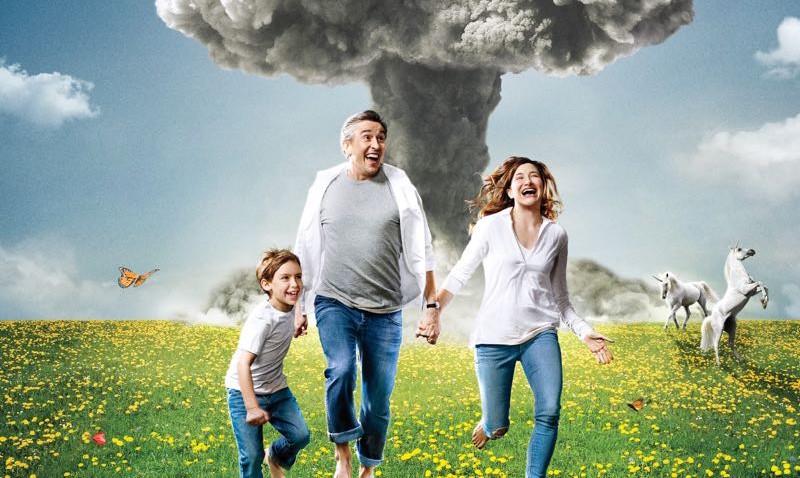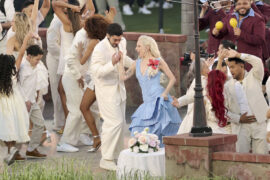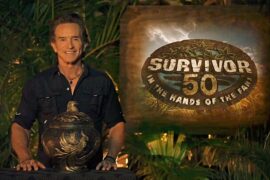 Warning! Do not watch Happyish. I’m still trying to scrub the first two episodes out of my eyes.
Warning! Do not watch Happyish. I’m still trying to scrub the first two episodes out of my eyes.
If the miserable, aggressively unlikable characters from the series were reviewing it they would call it a total piece of s—. There would be swearing. I’ve never heard so much cursing and I’m a Leafs fan.
The series, which airs Sundays at 9:30 on Showtime and streams exclusively in Canada on CraveTV, revolves around Thom Payne (Steve Coogan), a depressed ad man in his early forties. There are many references to historical thinkers such as Thomas Payne (the first episode is titled, “Starring Samuel Beckett, Albert Camus and Alois Alzheimer”). This may be an attempt to elevate the series. Do not fall for it.
Payne hates his life and feels he can’t be happy. The best he can aim for is “happyish.” His wife (Kathyrn Hahn) and co-worker (Bradley Whitford)–they’re happyish too.
His friends are also miserable. They swear a lot too. This gets old really fast.
Happyish was originally developed as a series starring Philip Seymour Hoffman. TV beat writers gathered in Los Angeles for a TCA press tour were shown a clip a year-and-a-half ago with Hoffman as Payne. It was a scene where the ad man is confronted by the Keebler Elves of cookie fame. Payne’s smug new boss wants to ditch the elves after 47 years. The elves swear at Payne and curse out his boss. It had a My World and Welcome To It, James Thurber kind of charm (that’s me trying to elevate this review) and, more important, was funny. With Hoffman as the lead, the series looked promising.
advertisement
This sneak peak strategy at press tour, however, is the kiss of death. The series never lives up to the funny clip. A dozen years ago, FX teased us with a clip from a series starring John Corbett called Lucky. When the full pilot was screened six months later, it became clear that the two minute clip was the only funny part of the series.
In the case of Happyish, the fall off is so monumental no one else will ever attempt this at press tour again.
In any event, Hoffman died and the series should have died with him. Not that what remains is all Coogan’s fault. The British writer/comedian has played boorish dolts before. Alan Partridge is a boorish dolt, but Coogan always found a way to make him sympathetic, which was quite a trick. Hoffman may have been better in this role, but the role is so unworthy of both of them lets not drill into this any deeper.
There are talented people behind Happyish. Ken Kwapis directs and is a producer. The man has The Larry Sanders Show, The Bernie Mac Show, The Office and Outsourced on his resume. Because of this, I watched a second episode of Happyish.
The creator/writer is Shalom Auslander, who won acclaim with his book, “Hope: a Tragedy.” The man knows from happyish, but there’s a darkness with this series that seems so forced and relentless that it seems more like it came from the author of “Hope: a Travesty.”
It may be that my reaction to Happyish is a generational thing. I have a similar, adverse reaction to Girls and to the new Billy Crystal comedy The Comedians. Much of the humour in these shows, to me anyway, seems rooted in darkness and negativity. This idea that everything sucks and life is desperate–woo man, pass the remote.
Anyway, do not watch Happyish. Read instead this feature I wrote last week for The Canadian Press which allowed me to write about the launch of the series without really saying anything about it. That made me happyish.







6 Comments
Not sure what I’m missing but this is the smartest, deepest, existentially reflective comedy I’ve seen in years. Maybe it’s because I’m English, work in advertising and live in the states — IMO finally someone is writing about what is really going on and that the MadMen era is dead. Long live Happyish ( though I doubt it based on the reviews)
Yes, it’s because you’re English.
Couldn’t agree more. I’m ten minutes into the second episode and I’m looking for negative reviews to validate my dislike of it. This show is so TRYHARD! The swearing seems so forced, the ‘modern life is rubbish’ scenes are contrived and unimaginative. I’d rather watch old episodes of thirtysomething to see middle-aged advertising guys and their wives juggle work and family pressures.
I thought this show was hilarious and one of the most honest approaches to modern life I’ve ever encountered in a tv show. I guess the author can’t deal with the truth. Real life IS yeah…f@&$…yeah…f@&$!
Bill,
It should have come as no surprise to you that the characters might come across as being “miserable” and “aggressively unlikable”, considering the rather blatant subject of the show. If you’ve never met people who curse too much and smoke pot when their children aren’t looking, then your friends are probably cursing too much and smoking pot when you aren’t looking too. Nobody likes being judged, Bill, and the fact is, we’re all a-holes sometimes.
Heck, I’m being one right now, directing this reply to the author of a nearly thoughtless and wholly heartless review from over a year ago for a cancelled TV show that people didn’t even like when it aired.
However, I just marathoned it on Netflix (perhaps also a generational thing) and I feel justified in defending the message that I believe the show is trying to convey. On a personal level, I relate to many of the sentiments expressed involving the undertaking of a less-than-ideal career path – not to mention getting grumpy about having done it – but then we can’t all be professional writers, can we, Bill?
More to the point, it seems to me that the show is trying to simultaneously highlight that life is hard, and that people are a-holes, but that some degree of contentedness is not impossible in spite of life’s overall futility. Is the show’s humor rooted in darkness and negativity? Yeah, sure. Spoiler alert: we all die in the end. The thing is though, there can be contentedness and joy in life even after we recognize and accept that fact, and if we try we can even find something to laugh about within our own suffering.
Imagine, for a moment, that you, Bill, were not… ahem… “one of the leading voices on the Canadian media and television scene”, but instead worked at, say, an advertising firm. What would your life look like? This very review suggests that you’re already capable of expressing smug satisfaction with your own work, so you’d probably do quite well for yourself in that field. You’d probably hate it (and yourself too, for that matter) and you’d feel quite alone in such a world of empty promises and shallow, short term gratification. But you’d make a boatload of money while you were at it, and that would feel like enough for a few years.
My point here, Bill, before I get too off track, is that you, a man who in his late middle-aged years is presumably happily doing what he wants for a living, are unqualified to review this kind of a show. There are subtle moments of happiness, joy, and dark humor throughout which together comprise all that some people have to latch onto in life in order to keep going, and it is of paramount concern to these people to find contentment with their own lives however they are able, in spite of all the could-haves, would-haves, should-haves, and the accompanying self-loathing.
The characters in this show do just that, and even over the course of the ten short episodes they learn to make their own lives better. They learn to adjust to life’s unavoidable difficulties, and they learn – believably, despite heedless accusations that their negativity is “forced and relentless” – to better roll with the punches life throws at us all. At most of us, anyway. They learn to be better friends, they learn to be better partners and parents, and most importantly, they learn how to make themselves – and therefore those around them – happier. Ish.
Regards,
-Matt
I LOVED the show.
It was smart and apt.
And, as someone who works in advertising, I can say- f***king true!